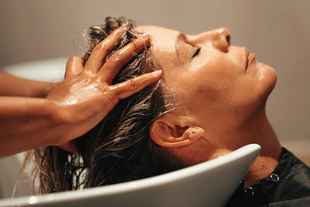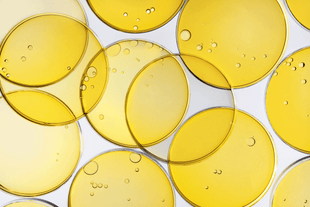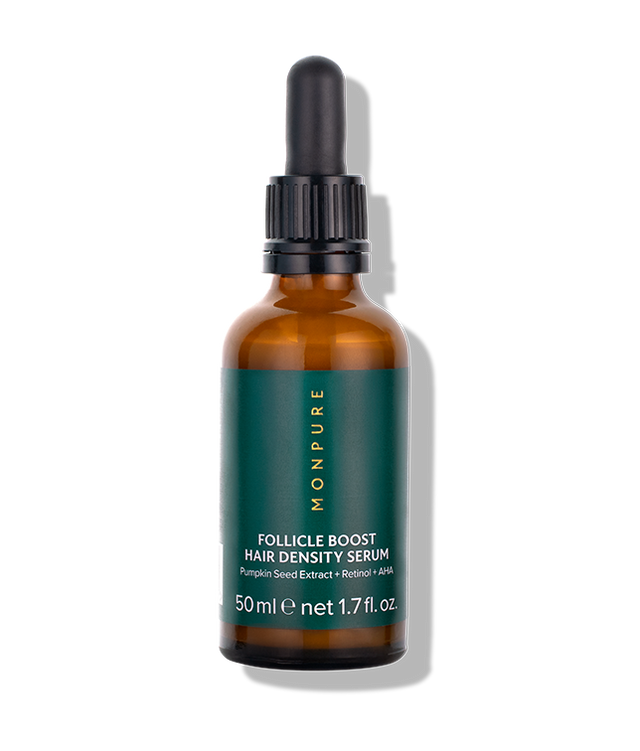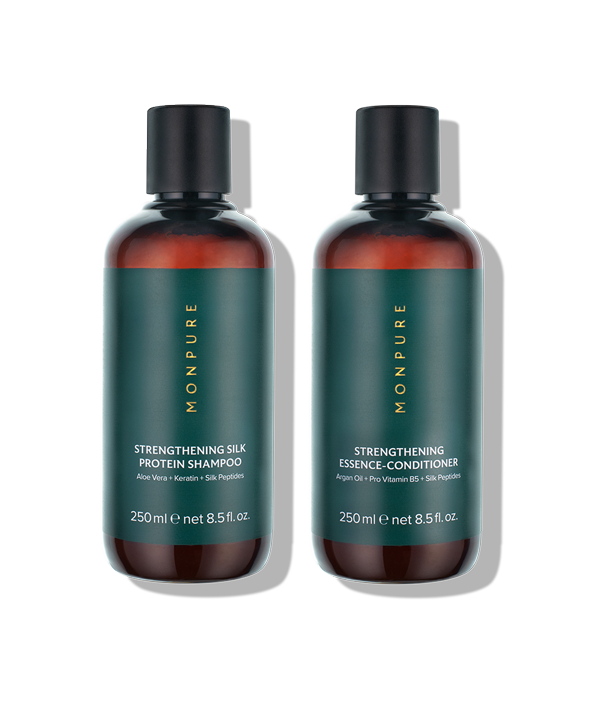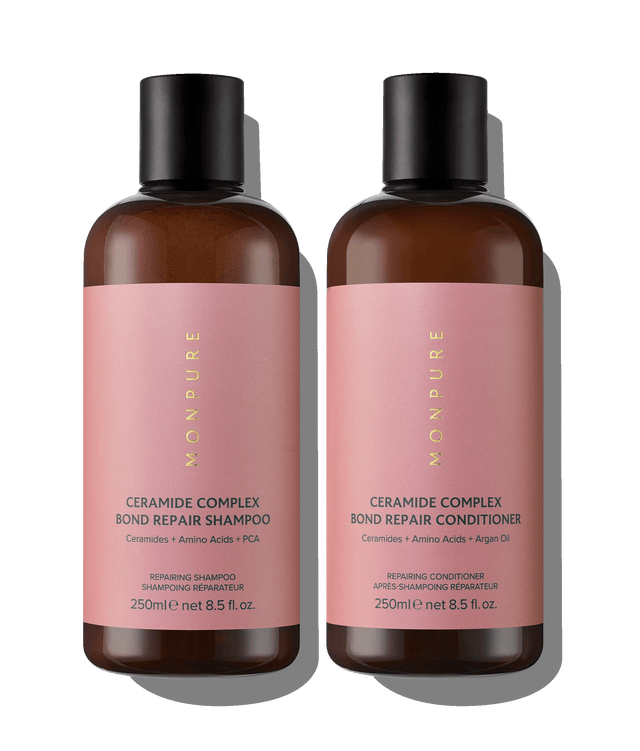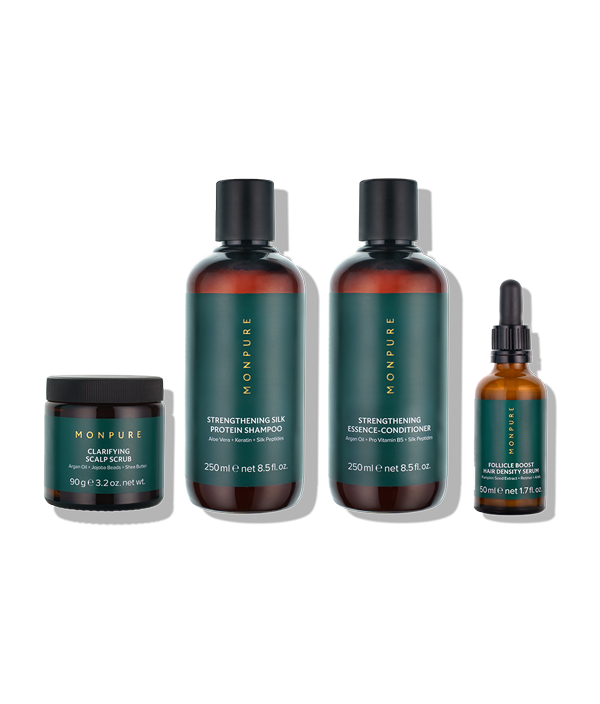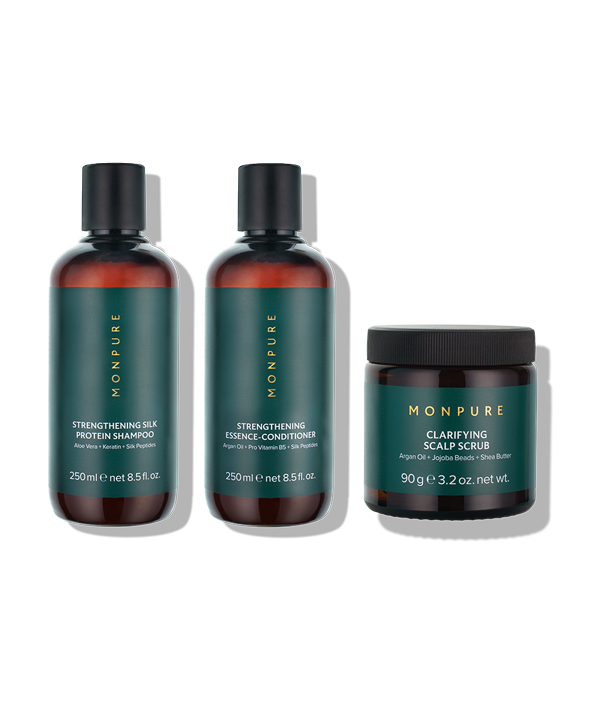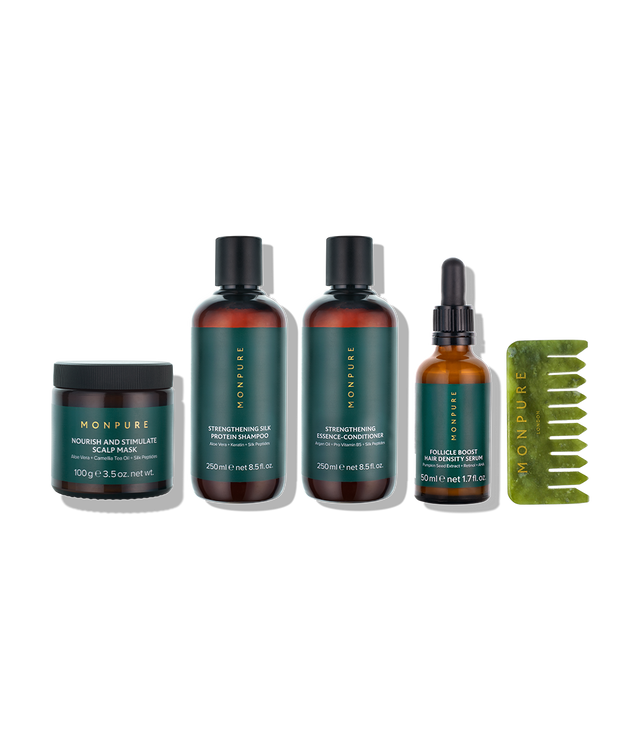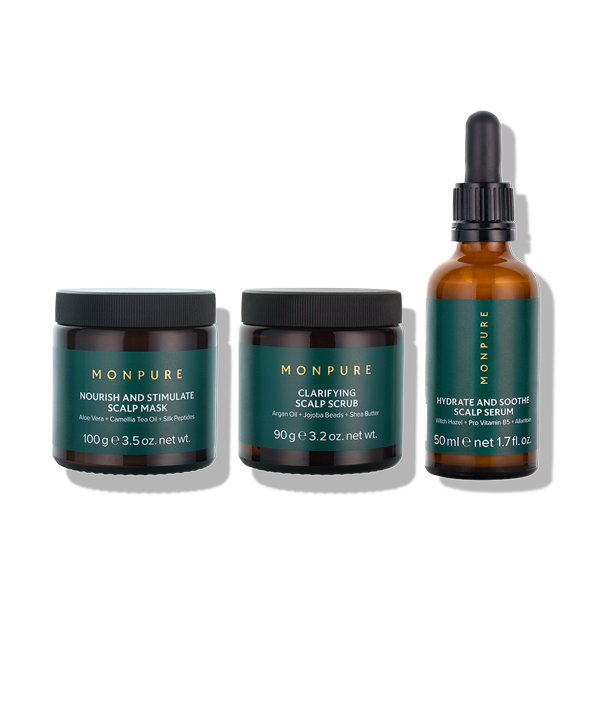Did you know that hair loss can often be related to diet, and more specifically, what’s missing in your diet?
Healthy hair growth requires nutrients, vitamins and minerals, so a deficiency in these vital sources of nourishment can lead to hair loss in various forms. Nutritional deficiencies can impact the hair’s structure, follicle development, immune cell functioning, and ultimately, hair growth. Research has shown a strong link between nutritional deficiencies and two common types of hair loss, telogen effluvium and androgenic alopecia.
At MONPURE, we believe in addressing your hair and scalp concerns holistically. We always suggest introducing a healthy combination of effective lifestyle and diet changes alongside expertly-grounded, nutrient-rich solutions for hair loss when tackling your deficiencies and their symptoms. It’s all about feeding your follicles with the vitamins and nutrients they need to prosper, both inside and out.

Vitamin and mineral deficiencies that lead to hair loss
Vitamin D
Vitamin D is an important nutrient that is essential to our health and deficiencies in this vital nutrient are linked to androgenic alopecia. Vitamin D is metabolised by keratin cells, the protein that makes up our hair and scalp skin. A deficiency can interfere with keratin production, resulting in fewer follicles being created and hair growth being inhibited. A deficiency in Vitamin D disrupts this essential process, leading to stunted hair growth and thinning.
Research shows that Vitamin D plays an important role in the hair growth cycle. In fact, studies illustrate that people with androgenic alopecia exhibit significantly lower levels of Vitamin D levels and that these levels decrease as hair thinning worsens.
Reasons for insufficient vitamin D levels include:
- Spending more time indoors
- Living in an environment with minimal sun exposure
- Not eating foods packed with the nutrient
Vitamin D rich foods include:
- Salmon
- Tuna
- Eggs
- Mushrooms
Vitamin B12
Vitamin B12 is essential for rapid cell division and growth, playing a major part in red blood cell formation. Hair follicle cells divide at some of the fastest rates within the body, requiring adequate supplies of vitamin B12 to support this prolific growth. It is metabolised in the skin by keratinocytes, which are skin cells that process keratin, the protein building blocks that make up our hair, nails, and skin.
Studies have shown that Vitamin B12 promotes healthy hair growth by assisting in the production of oxygen-rich red blood cells, which feed hair follicles and allow them to prosper. Because the human body doesn’t produce Vitamin B12 naturally, it’s important to get this nutrient from your diet.
Vitamin B12 can be found in animal-based foods such as:
- Fish
- Poultry
- Meat
- Dairy
- Eggs
Vitamin B6
Vitamin B6 plays a vital role in hair follicle health and normal hair growth cycles. It contributes to production of red blood cells to nourish follicles, synthesis of structural protein keratin, and absorption of nutrients like zinc that hair relies on.
B6 regulates androgen hormones like testosterone that can trigger follicular miniaturisation and gradual baldness when unbalanced. It also acts as an antioxidant, protecting fragile follicle cells from free radical damage that stalls growth.
Getting enough B6 prevents hair loss issues like telogen effluvium shedding and androgenic alopecia thinning. Key food sources include poultry, fish, whole grains, vegetables, nuts and nutritional yeast. As an essential water-soluble vitamin, stores get used up quickly and require regular replenishment.
Vitamin E
Vitamin E strongly supports scalp health and protects against oxidative damage to hair follicles. The environment assaults hair continuously with solar radiation, toxins, humidity and heat styling. Vitamin E absorbs this free radical bombardment instead of delicate follicles.
It also boosts microcirculation to nourish hair roots and stimulates cleansing by unclogging blocked sebaceous ducts around follicles. Massaging vitamin E into the scalp enhances this circulatory effect. Its antioxidant and anti-inflammatory properties optimise conditions for unimpeded growth.
Excellent dietary sources include plant oils, nuts, seeds, spinach, avocado, and shrimp. As an antioxidant, vitamin E works most powerfully in tandem with vitamin C, making this nutrient combo vital to hair loss defence.
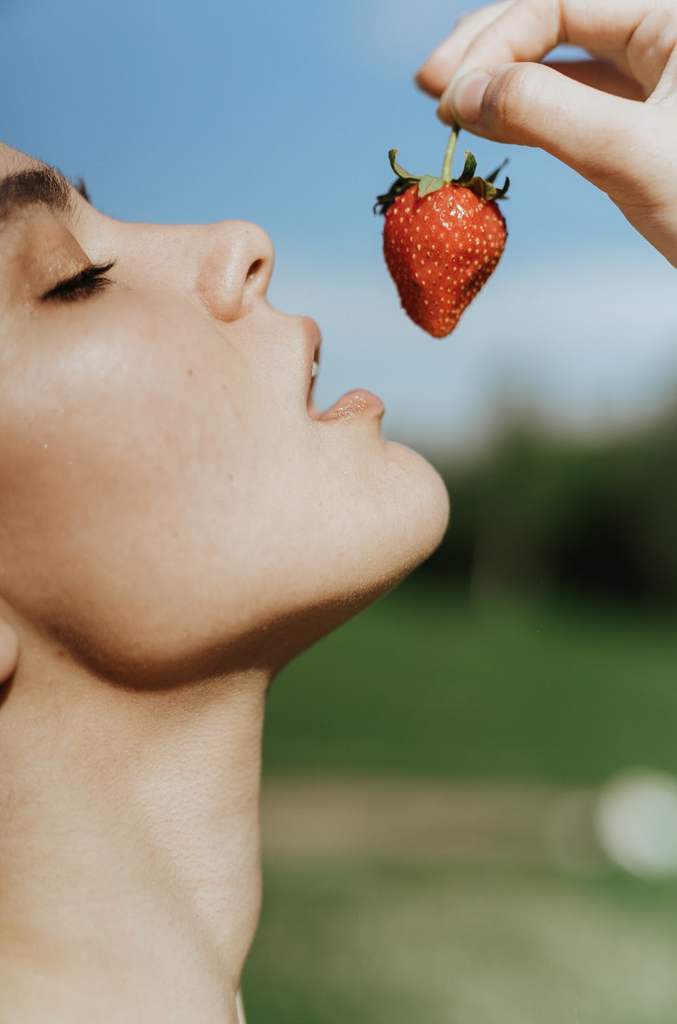
Vitamin C
Vitamin C powerfully benefits hair by promoting collagen protein building blocks within scalp connective tissues that anchor hair follicle roots. It also accelerates cell renewal and growth rates for faster hair regeneration.
As an antioxidant, C protects against follicle damage from UV radiation, toxins and hormones that create inflammatory conditions stunting hair growth. It enhances iron absorption critical for oxygenating follicle cells. Vitamin C increases blood flow to the scalp for optimal nutrient delivery as well.
Getting enough C prevents issues like brittle strands, dry flaking scalp, slowed growth and breakage. Citrus fruits, bell peppers, strawberries and broccoli provide excellent dietary C to support healthy hair maintenance.
Iron
An iron deficiency is the world’s most common nutritional deficiency and is a well-known cause of hair loss. Specifically, iron deficiency is linked to a diffuse and rapid onset form of hair loss called telogen effluvium.
Research has shown that iron affects hair growth as:
- Iron produces haemoglobin, the protein found in red blood cells that transports oxygen to various tissues and organs. When your iron levels are low, it becomes harder to transport oxygen to important cells, such as the cells that stimulate hair growth.
- Iron is an essential component in an enzyme called ribonucleotide reductase that helps stimulate follicles, so low stores of this crucial enzyme can stall new growth and lead to fallout.
Hair follicle cells are particularly sensitive to decreasing levels of iron and a deficiency of this essential nutrient plays a central role in hair loss, particularly in certain stages in the lifetime.
Premenopausal women are at higher risk of iron deficiencies due to menstrual blood loss, while postmenopausal women are at a higher risk due to gastrointestinal blood loss. In fact, about 20% of women and 50% of pregnant women do not have enough iron in their body.
Luckily, hair loss as the result of an iron deficiency is almost always recoverable. Studies have shown that the reversal of an iron deficiency has led to restoration of hair growth.
By adjusting your diet or introducing supplements to restore your iron supply, it’s almost always possible to regrow your hair to its maximum potential.
Iron-rich foods to counteract an iron deficiency include:
- Red meat
- Legumes (kidney beans, chickpeas, edamame beans)
- Nuts
- Dried fruit
- Spinach
- Dark chocolate
Zinc
Zinc deficiencies are linked to a gradual form of hair loss called androgenic alopecia. Zinc is an essential trace element, which means that the body cannot generate it on its own - it must be supplied through diet, supplements or topically. Zinc builds healthy cells, aids in absorbing nutrients and regulates hormones (in this case, androgen hormones that cause hair thinning). An imbalance can upset these functions, leading to hair thinning.
Zinc imbalances can lead to gradual hair thinning, as Zinc aids in:
- Building healthy cells
- Regulating androgen hormones
- The absorption of other nutrients
Research has shown that in patients with androgenic alopecia, all participants had significantly lower zinc levels than healthy controls.
Zinc-rich foods that can bolster your intake include:
- Meat
- Oysters
- Shellfish
- Legumes
- Dairy
- Eggs
- Whole grains (quinoa, rice and oats)
Hair loss can take a serious emotional toll, but luckily, hair loss brought on by nutrient deficiencies can be treated by effectively adding vitamin-rich foods to your diet and feeding your follicles with optimal nutrients. MONPURE always suggests consulting your doctor to investigate nutrient deficiencies before starting any supplement treatment. The best place to start is switching up your diet, ensuring your body has everything it needs to function and (as always), starting at the scalp when it comes to maximising your hair growth journey.

Feed Your Follicles with MONPURE
Coupled with boosting your nutritional intake, MONPURE’s Nourish and Stimulate Scalp Mask works like food to the scalp. It delivers essential nutrients, vitamins and fatty acids to cultivate the ultimate environment for hair growth. Hero ingredient, camellia tea oil, is rich in Vitamins A, B, C and E, delivering an intense hit of nourishment to neglected scalps and dull hair, stimulating hair follicles and enhancing the dermatological condition of the scalp.
This nourishing scalp treatment also contains hydrating star ingredients castor oil and argan oil, both of which are brimming with hair-healthy nutrients that feed the follicles. Castor oil is extremely nourishing, with a nutritional makeup composed of a powerful blend of vitamins, fatty acids, proteins and antioxidants. Argan oil has a high potency in antioxidants, Vitamin E and essential fatty acids that regulate moisture, strengthen and smooth the hair, while restoring silkiness and shine.
The Follicle Boost Hair Density Serum is also packed with vital nutrients that stimulate the follicles and minimise hair loss. Hero ingredient, pumpkin seed extract, blocks the production of DHT, the hormone responsible for hair loss. It is also abundant in zinc, magnesium and iron, thus holding a protective effect against deficiency-driven hair loss. This innovative ingredient is also brimming with Vitamin E and Linoleic Acid, which hold strong anti-inflammatory effects and decrease oxidation on the scalp, which also combats hair loss.
Frequently Asked Questions
Can hair loss due to vitamin deficiency be reversed?
Yes, adjusting your diet or supplements can restore hair growth by supplying vital nutrients to follicles. Catching deficiencies early optimises regrowth potential.
What vitamin is best for hair loss?
No single vitamin treats all hair loss. However, vitamins D, B12, C and E, zinc, iron and proteins like biotin and collagen provide building blocks for healthy hair. Balancing intake boosts growth and minimises shedding.
Can too much vitamin D cause female hair loss?
Yes, vitamin D overdose is rare but can prompt hair shedding. Work with your doctor to find the right vitamin D level for you.






